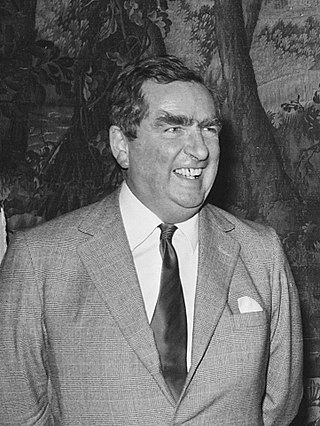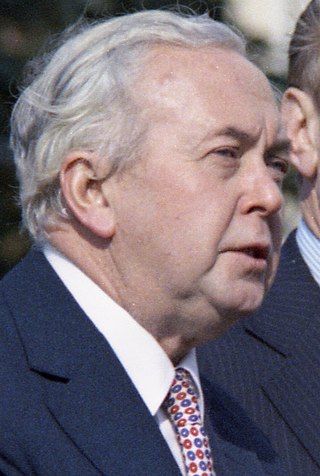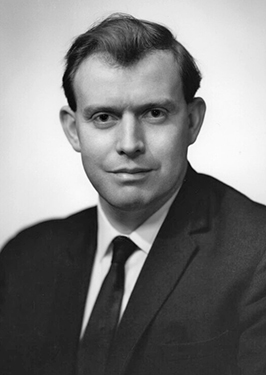Related Research Articles

The 1997 United Kingdom general election was held on Thursday, 1 May 1997. The governing Conservative Party led by Prime Minister John Major was defeated in a landslide by the Labour Party led by Tony Blair, achieving a 179-seat majority.

The 1983 United Kingdom general election was held on Thursday 9 June 1983. It gave the Conservative Party under the leadership of Margaret Thatcher the most decisive election victory since that of the Labour Party in 1945, with a majority of 144 seats and the first of two consecutive landslide victories.

Roy Sydney George Hattersley, Baron Hattersley, is a British politician, author and journalist from Sheffield. A member of the Labour Party, he was MP for Birmingham Sparkbrook for over 32 years from 1964 to 1997, and served as Deputy Leader of the Labour Party from 1983 to 1992.

Denis Winston Healey, Baron Healey, was a British Labour Party politician who served as Chancellor of the Exchequer from 1974 to 1979 and as Secretary of State for Defence from 1964 to 1970; he remains the longest-serving Defence Secretary to date. He was a Member of Parliament from 1952 to 1992, and was Deputy Leader of the Labour Party from 1980 to 1983. To the public at large, Healey became well known for his bushy eyebrows, his avuncular manner and his creative turns of phrase.

The February 1974 United Kingdom general election was held on Thursday 28 February 1974. The Labour Party, led by Leader of the Opposition and former Prime Minister Harold Wilson, gained 14 seats but was seventeen short of an overall majority. The Conservative Party, led by incumbent Prime Minister Edward Heath, lost 28 seats. That resulted in a hung parliament, the first since 1929. Heath sought a coalition with the Liberals, but the two parties failed to come to an agreement and so Wilson became Prime Minister for a second time, his first with a minority government. Wilson called another early election in September, which was held in October and resulted in a Labour majority. The February election was also the first general election to be held with the United Kingdom as a member state of the European Communities (EC), which was widely known as the "Common Market".
The Socialist Campaign Group, also simply known as the Campaign Group, is a UK parliamentary caucus of Labour Members of Parliament in the House of Commons of the United Kingdom. The group also includes some MPs who formerly represented Labour in Parliament, but have had the whip withdrawn or been expelled from the party.

The 1922 United Kingdom general election was held on Wednesday 15 November 1922. It was won by the Conservative Party, led by Prime Minister Andrew Bonar Law, which gained an overall majority over the Labour Party, led by J. R. Clynes, and a divided Liberal Party.

Laurence Anthony Robertson is a British politician who has served as the Member of Parliament (MP) for Tewkesbury since 1997. A member of the Conservative Party, he chaired the Northern Ireland Affairs Committee for seven years, from 2010 to 2017.

Eric Graham Varley, Baron Varley, was a British Labour Party politician and cabinet minister on the right-wing of the party. He was the Member of Parliament for Chesterfield from 1964 to 1984.

Eric Samuel Heffer was a British socialist politician. He was Labour Member of Parliament for Liverpool Walton from 1964 until his death. Due to his experience as a professional joiner, he made a speciality of the construction industry and its employment practices, but was also concerned with trade union issues in general. He changed his view on the European Common Market from being an outspoken supporter to an outspoken opponent, and served a brief period in government in the mid-1970s. His later career was dominated by his contribution to debates within the Labour Party and he defended the Liverpool City Council.
The 1922 Labour Party leadership election was the first leadership election for the posts of chairman and leader of the Parliamentary Labour Party. Previously the position had been simply the "Chairman of the Parliamentary Labour Party".
Jesse Dickson Mabon, sometimes known as Dick Mabon, was a Scottish politician, physician and business executive. He was the founder of The Manifesto Group of Labour MPs, an alliance of moderate MPs who fought the perceived leftward drift of the Labour Party in the 1970s. He was a Labour Co-operative MP until October 1981, when he defected to the SDP. He lost his seat in 1983, and rejoined the Labour Party in 1991.
The 1976 Labour Party leadership election occurred when Harold Wilson resigned as Leader of the Labour Party and Prime Minister. It is the only occasion when the Labour Party, whilst in government, has had a leadership election with more than one candidate.
The 1980 Labour Party leadership election was held following the resignation of James Callaghan, who had been Prime Minister from 1976 to 1979 and had stayed on as leader of the Labour Party for eighteen months in order to oversee an orderly transition to his favoured successor, Denis Healey, over his own deputy Michael Foot. However, during this period the party had become bogged down in internal arguments about its procedures and future direction.
John Donkin Dormand, Baron Dormand of Easington was a British educationist and Labour Party politician from the coal mining area of Easington in County Durham, in the north-east of England. He was Member of Parliament (MP) for the Easington constituency from 1970 until his retirement in 1987.
The 1988 Labour Party leadership election saw Tony Benn, identified with the left wing of the British Labour Party, challenge the incumbent leader Neil Kinnock identified with the more moderate social democratic wing.
Elections to the Labour Party's Shadow Cabinet took place on 19 November 1981. There were 15 posts, rather than 12 as in previous years. In addition to the 15 members elected, the Leader, Deputy Leader, Labour Chief Whip, Labour Leader in the House of Lords, and Chairman of the Parliamentary Labour Party were automatically members.

The Social Democratic Party (SDP) was a centrist to centre-left political party in the United Kingdom. The party supported a mixed economy, electoral reform, European integration and a decentralised state while rejecting the possibility of trade unions being overly influential within the industrial sphere. The SDP officially advocated social democracy, but its actual propensity is evaluated as close to social liberalism.
The 1955 Greenock by-election was a parliamentary by-election held on 8 December 1955 for the British House of Commons constituency of Greenock in Renfrewshire, Scotland.
The Labour Solidarity Campaign was a British political organisation associated with the Labour Party, founded in February 1981.
References
- ↑ Dr J. Dickson Mabon: Driving force behind the Manifesto Group of MPs and 'sergeant-major of the Labour Party's sensible ranks' - The Independent newspaper (14 April 2008)
- ↑ Miliant Choice for Bradford, 'Yorkshire Post', Saturday 26 June 1982, pg.1